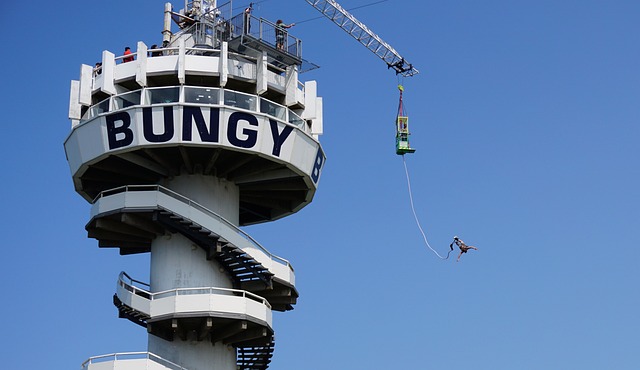Hey there adrenaline junkies and curious thrill-seekers! Have you ever wondered if bungee jumping could lead to a heart attack? As someone who loves adventure, I found myself pondering this question before I took the leap myself.
The answer is NO, bungee jumping does not directly cause a heart attack. The adrenaline rush experienced during a bungee jump is a temporary and controlled response, similar to the “fight or flight” reaction. While your heart rate may increase during the jump, it quickly returns to normal once the experience is over. For most healthy individuals, this temporary increase in heart rate does not pose a significant risk to heart health.
However, it is essential to prioritize your heart health before attempting any extreme activity like bungee jumping. If you have any pre-existing heart conditions or cardiovascular risk factors, it is advisable to consult with your doctor before participating in such activities.
In this article, I’ll explore the relationship between bungee jumping and heart health. Let’s debunk the myths and unravel the truth!
Understanding Bungee Jumping: The Thrill and Risk Factors
Before I jump into the heart of the matter (pun intended), let’s get a grasp of what bungee jumping is all about and what makes it such an adrenaline-pumping activity.
Bungee jumping, my fellow adventure enthusiasts, is an extreme sport that involves leaping from a great height while attached to an elastic bungee cord. It’s that incredible feeling of free-falling, only to be dramatically snapped back up just moments before you hit the ground. Sounds intense, right?
The allure of bungee jumping lies in the unparalleled rush of adrenaline coursing through your veins as you take that daring plunge. The mix of excitement, fear, and thrill creates an experience like no other.
However, as with any extreme activity, there are risks involved. Let’s delve into some of the key risk factors associated with bungee jumping:
- Equipment Safety: The most critical factor when it comes to bungee jumping is ensuring the safety and reliability of the equipment. This includes the bungee cord itself, harnesses, and other rigging gear. Reputable bungee jumping operators adhere to strict safety standards to minimize the risk of accidents.
- Height and Location: The height from which you jump can significantly impact the experience and potential risks. Bungee jumping locations can vary from bridges to cranes, or even specially designed platforms. Proper risk assessment and location preparation are crucial for a safe jump.
- Physical Demands: Bungee jumping subjects the body to intense forces, especially during the initial fall and subsequent rebound. Participants must be physically capable of handling these forces without compromising their health.
- Mental Preparedness: The psychological aspect of bungee jumping is equally important. Overcoming fear and maintaining composure during the jump can affect your overall experience and safety.
Now, before I get ahead of myself, let me say this – bungee jumping is generally a safe activity when conducted by experienced professionals and with proper safety measures in place. But what about the heart attack concerns? Stay with me as I debunk the myths and get to the heart of the matter!
Dispelling the Myths: The Link Between Bungee Jumping and Heart Attacks
Alright, let’s address the big question on everyone’s mind: can bungee jumping really cause a heart attack? There are some misconceptions and fears surrounding this extreme sport, so it’s time to set the record straight!
First and foremost, it’s essential to understand that bungee jumping does not directly cause heart attacks. Whew, that’s a relief, right? The act of jumping and experiencing that heart-stopping thrill won’t put you at immediate risk of having a heart attack.
Now, you might wonder why there’s even a concern about heart attacks and bungee jumping. Well, it all comes down to the adrenaline rush! When you’re about to take that daring leap, your body activates the “fight or flight” response, which is a natural survival mechanism triggered by adrenaline.
During the “fight or flight” response, your heart rate and blood pressure increase. This is your body’s way of preparing you to face a perceived threat or danger. It’s the same response you’d experience if you suddenly encountered a wild bear (yikes!).
But here’s the key difference – while bungee jumping does lead to a surge of adrenaline, it’s a temporary and controlled situation. Once you’ve taken the leap and the thrilling rebound is over, your body returns to its normal state, and so does your heart rate.
It’s crucial to understand that a temporary increase in heart rate during a bungee jump is not the same as having a heart attack. A heart attack, or myocardial infarction, is caused by a blockage in the blood vessels supplying the heart, resulting in a lack of oxygen and damage to the heart muscle.
Studies have shown that the adrenaline surge during bungee jumping is not a significant risk factor for heart attacks in healthy individuals. The overall risk of experiencing a heart attack during a bungee jump is incredibly low.
However, it’s essential to be responsible and mindful of your own health. If you have a pre-existing heart condition or other cardiovascular risk factors, it’s wise to consult with your doctor before taking on any extreme activity, including bungee jumping.
So, to sum it up – bungee jumping won’t cause a heart attack directly, but it’s always better to err on the side of caution, especially if you have any underlying health concerns.
The Impact of Adrenaline on the Heart: The Truth Behind the “Fight or Flight” Response
Let’s dive deeper into the fascinating world of adrenaline and its impact on our hearts during those electrifying moments of bungee jumping!
When faced with intense situations, whether it’s a thrilling bungee jump or a sudden fright, our bodies trigger the “fight or flight” response. This is a primal survival mechanism designed to prepare us for potentially dangerous or life-threatening situations.
So, what exactly happens when adrenaline kicks in? Well, first, our brains recognize the situation as a potential threat, whether it’s real or perceived. This triggers the release of adrenaline from our adrenal glands into the bloodstream.
Once adrenaline hits our bloodstream, it starts to work its magic. Our heart rate increases and our blood vessels constrict. This sends a surge of oxygenated blood to essential organs, including the heart, brain, and muscles, to provide them with the extra energy they might need to deal with the situation at hand.
During a bungee jump, as you stand on the edge, ready to take the leap, your body senses the exhilarating drop as a thrilling, albeit non-life-threatening, moment. As a result, adrenaline is released, pumping up your heart rate and preparing you for the jump.
But here’s the cool part – our bodies are incredibly efficient machines! Once you’ve made the jump and experienced that heart-stopping free fall, the adrenaline begins to subside as your body realizes there’s no actual danger to overcome. As you bounce back up, your heart rate returns to its normal rhythm, and your body starts to relax again.
It’s worth noting that the adrenaline surge during a bungee jump is temporary and relatively short-lived. The whole experience, from the jump to the rebound, typically only lasts a few minutes. So, even though your heart might be racing with excitement, it’s not subjected to prolonged stress.
Remember, the “fight or flight” response is a natural and essential part of our survival instinct. It helps us tackle challenging situations effectively. For most healthy individuals, experiencing this adrenaline rush during bungee jumping is part of what makes the activity so thrilling and enjoyable.
However, it’s essential to listen to your body and be aware of your own health limitations. If you have any concerns about how your heart might react to the adrenaline rush, consider consulting with a medical professional before taking that leap of faith.
Now that you understand the impact of adrenaline on the heart and body, it’s time to conquer your fears and continue your journey to discover the safety measures and precautions you can take to ensure a safe bungee jumping experience.
The Importance of a Healthy Heart: Precautions for Bungee Jumping Enthusiasts
It’s crucial to recognize the significance of having a healthy heart before taking on any high-adrenaline activity like bungee jumping. Let’s explore some essential precautions and considerations for all you bungee jumping enthusiasts out there:
- Prioritize Your Heart Health: Before even considering bungee jumping, it’s essential to assess your overall heart health. Regular exercise, a balanced diet, and routine medical check-ups are fundamental in maintaining a healthy heart. If you have any pre-existing heart conditions or cardiovascular risk factors, consult with your doctor to determine if bungee jumping is a suitable activity for you.
- Know Your Limits: Bungee jumping requires a level of physical and mental strength. If you’re new to extreme sports or have any health concerns, consider starting with less intense activities and gradually working your way up. Build your confidence and physical stamina before taking the leap into bungee jumping.
- Choose Certified Operators: Safety should always be a top priority! Research and select bungee jumping operators with an excellent safety track record and certifications. Reputable operators adhere to strict safety guidelines, use quality equipment, and have experienced staff to ensure a safe and enjoyable experience.
- Listen to the Experts: Pay close attention during the safety briefing before your jump. Follow all instructions provided by the bungee jumping staff, as they are trained to keep you safe and secure during the entire process. Ask questions if you’re unsure about anything – there’s no such thing as a silly question when it comes to safety.
- Stay Hydrated and Rested: Proper hydration and adequate rest are essential for any physical activity, including bungee jumping. Ensure you’re well-hydrated and get a good night’s sleep before your jump. Being in a well-rested state will help you stay focused and make the most of your adrenaline-pumping experience.
- Stay Calm and Composed: As you approach the edge and prepare to jump, keep your cool! Stay calm, take deep breaths, and trust in the equipment and safety measures in place. Remember, it’s normal to feel nervous or excited, but maintaining composure will enhance your overall enjoyment.
- Have an Emergency Plan: While the risks associated with bungee jumping are relatively low, it’s always good to be prepared. Familiarize yourself with the emergency procedures provided by the operators, just in case. Knowing what to do in an unlikely event can give you peace of mind.
Remember, adventure is about pushing your boundaries, but it’s essential to do so responsibly and with a focus on your well-being.
Real Risks and Safety Measures: Ensuring a Safe Bungee Jumping Experience
Now, let’s dive into the nitty-gritty of the real risks associated with bungee jumping and the safety measures that reputable operators implement to ensure your safety throughout this exhilarating experience.
- Real Risks of Bungee Jumping: It’s important to be aware of the actual risks involved in bungee jumping. While the activity itself is thrilling, the likelihood of accidents is relatively low when conducted by professional operators. The most common risks include minor injuries like sprains or bruises, which can occur due to the intense forces experienced during the jump. However, catastrophic accidents are exceptionally rare due to strict safety protocols.
- Equipment and Inspections: Reputable bungee jumping operators prioritize safety above all else. They conduct regular inspections and maintenance of all equipment, including the bungee cords, harnesses, and jumping platforms. Additionally, they follow industry standards and guidelines to ensure their facilities are safe for participants.
- Weight and Height Limits: Bungee jumping operators set weight and height limits for participants to ensure the equipment can safely handle the forces generated during the jump. Adhering to these limits is essential to maintaining the integrity of the experience and your safety.
- Safety Briefings: Before you take the plunge, you’ll receive a comprehensive safety briefing. Pay close attention as the instructors guide you through the dos and don’ts of bungee jumping. Understanding and following their instructions will minimize potential risks.
- Backup Safety Measures: Reputable operators use backup safety measures to provide an added layer of protection. These can include redundant cords, secondary attachments, and additional safety equipment to ensure your safety in case of any unforeseen circumstances.
- Weather Conditions: Bungee jumping operators are vigilant about monitoring weather conditions. They will suspend or postpone jumps if weather conditions pose any risks to participants’ safety. While it may be disappointing to have your jump delayed, remember that it’s for your own well-being.
- Experience and Training: The staff at reputable bungee jumping facilities are experienced professionals who undergo rigorous training. They know the ins and outs of the activity, ensuring that all safety protocols are followed meticulously.
- Medical Checks: Some operators may require participants to undergo a basic medical check-up before bungee jumping. This is a precautionary measure to identify any underlying health issues that could pose a risk during the activity.
It’s essential to do your research, read reviews, and select a facility with a proven track record of safety and customer satisfaction.
Remember, bungee jumping is an electrifying experience that can be enjoyed with confidence when you prioritize your safety. Trust in the professionals, follow their guidance, and embrace the thrill of defying gravity in a controlled and secure environment.
Who Should NOT Do Bungee Jumping: A Comprehensive Guide for Safety
Personal Stories and Testimonials: Insights from Bungee Jumping Enthusiasts
Get ready to be inspired, my fellow thrill-seekers, as I delve into the personal stories and testimonials of brave souls who’ve taken the leap into the world of bungee jumping! These individuals share their experiences, emotions, and how bungee jumping has impacted their lives.
- Alicia’s Triumph Over Fear: Alicia, a bungee jumping enthusiast, recalls her first jump as a life-changing moment. Overcoming her fear of heights and taking that leap allowed her to conquer not just the jump itself but also her own self-doubts. She describes the adrenaline rush as a surge of empowerment, making her feel invincible and capable of achieving anything.
- Mark’s Spiritual Awakening: For Mark, bungee jumping was more than just an adrenaline rush; it became a spiritual experience. As he plummeted toward the ground and then soared back up, he felt a profound sense of connection with nature and the world around him. Mark’s jump became a moment of self-discovery and a reminder of the beauty of life.
- Sarah’s Confidence Boost: Sarah, a self-professed introvert, found her voice and gained confidence through bungee jumping. She describes the jump as a metaphor for breaking free from self-imposed limitations. The encouragement and support from fellow jumpers and the bungee jumping crew made her realize the strength of community and the power of believing in oneself.
- David’s Journey to Healing: David, who had faced personal challenges, credits bungee jumping as a catalyst for healing. The act of jumping off that ledge symbolized leaving his troubles behind and embracing a fresh start. The rush of adrenaline helped release pent-up emotions, leaving him feeling rejuvenated and ready to face life’s hurdles with renewed vigor.
- Jenny’s Celebration of Life: Jenny, a cancer survivor, celebrated her victory over the disease with a bungee jump. For her, the leap represented resilience and a celebration of life’s precious moments. With tears of joy and laughter, Jenny felt alive like never before, embracing every bit of life’s wonder.
These personal stories demonstrate that bungee jumping is more than just a thrilling adventure; it can be a life-affirming and transformative experience. It pushes people beyond their comfort zones, unlocking inner strength and resilience they might not have known existed.
Of course, it’s crucial to remember that everyone’s experience is unique. Some may find bungee jumping to be an empowering journey, while others might view it as a one-time bucket list item. Regardless of the outcome, the act of taking that leap and embracing the adrenaline rush becomes a cherished memory that lasts a lifetime.
Conclusion
In conclusion, I have thoroughly explored the question of whether bungee jumping can cause a heart attack, and the answer is a resounding NO. Bungee jumping itself does not directly cause heart attacks. While the activity triggers an adrenaline rush, it is a temporary and controlled response, not posing a significant risk to the heart health of most individuals. The “fight or flight” response experienced during the jump is part of the thrill, making bungee jumping a safe and exhilarating adventure.
To ensure a safe bungee jumping experience, it is vital to prioritize heart health and overall well-being. Regular exercise, a balanced diet, and consulting with a medical professional, if you have any underlying heart conditions, are essential steps. Additionally, choosing certified operators with excellent safety records and following their instructions diligently further minimizes any potential risks associated with the activity.
So, if you’ve ever dreamt of taking that exhilarating leap, now is the time to embrace the adventure with confidence. Bungee jumping allows us to conquer fears, break free from limitations, and experience the beauty of life from new heights. Remember, the heart-pounding excitement of bungee jumping is an opportunity to connect with our inner strength and the world around us.
As you conclude this journey, I encourage you to live life boldly and explore the boundless wonders that await. Embrace each moment with courage and curiosity, and let the spirit of adventure guide you on a path of discovery and growth.










